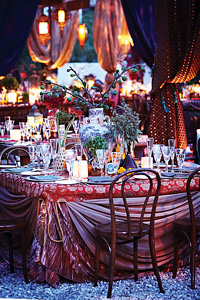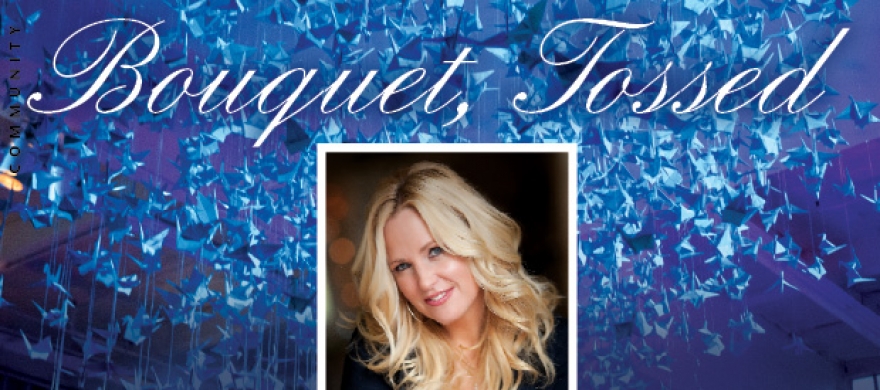“If I wasn’t the girl who dreamed about her wedding day since she was five years old, then there must be a lot of other people out there like me,” thought Kristin Banta (’94), a former anti-bride who now helms a full-service event planning firm that caters to nontraditional brides and grooms.
“I thought of weddings: ‘that sounds so boring and not my thing. Aren’t they just all white?’ I couldn’t see myself in it at all.”
The thought of planning weddings never even crossed Banta’s mind as she pursued a career producing music and fashion industry events with a local designer. It wasn’t until she was encouraged to approach wedding production as she would anything else in her life—with humor and irony, two concepts rarely associated with the “Big Day”—that she looked at the event with a creative eye. “The idea of bringing something new to the wedding space, looking at things from a more obtuse angle, and having a different take on weddings was very exciting to me,” she recalls.
With themes like “Gypsy Reverie” and “South Beach on the West Coast,” Banta now brings her unique brand of quirk and contradiction to a space usually reserved for formulaic pomp and circumstance.
“I wasn’t interested in all those clichés that really get us away from the heart of what makes that day cool,” she explains, referencing dwindling trends of bunting banners and buffet lines that have pervaded the wedding industry. “I have to be inspired by it and Ihave to be excited about it or else work isn’t fun...and buffets don’t inspire me.”
Rather, Banta is motivated by couples who dream of a wedding modeled after Dante’s Inferno or Tolkien’s Middle Earth, who prefer to serve breakfast for dinner, and who let their event planner tell their story aesthetically—a product of the stage lighting and set design experience that came along with her theatre degree.
“Creating that total journey is what determines the success of an event,” she explains. “We have to go on a journey and that journey has to be rooted in who this couple is.”

Banta finds inspiration in the most obscure of objects and circumstances, whether it be a chair that means something to the couple or a childhood memory of folding paper cranes to aid an ailing loved one’s recovery. The latter became the focal point of couple Sarah and Michael McConnell’s televised wedding on Bravo’s The Wedding Party, Banta’s recent foray into the televised wedding space. “Everything became so effortful,” she remembers, of the economic downturn and its effects on her boutique business. “I started looking at ways that we could expand our brand without compromising the level of taste and the discrimination with which we take on events.”
The special, Bravo’s first and only wedding program, which aired this February on Valentine’s Day, follows Banta’s work with the McConnells, a couple that epitomizes the “Kristin Banta client.” “My clients are those who know who they are and understand why they are together,” she explains. “They get the point of this day.”
True to form, the McConnells ditched the bridal party, cake, favors, and flowers and opted for less-conventional elements, such as a billowy black bridal gown, glossy antler centerpieces, and a dramatic flock of blue-lit paper cranes flying out of suspended birdcages hung in the industrial space. “I don’t believe in doing anything just because somebody says that’s what you do,” contends Banta, who also helps coming-of-age teens, corporate clients, and other revelers celebrate life’s momentous occasions.
“I question things a little bit more, so those are the kinds of clients that are usually coming to us: those that usually don’t connect with the traditional things as they’ve seen them.”
While you won’t find a bouquet toss or garter throw at a Banta event, there is still much for the attendees and viewers to take away. “My hope is that, even if the audience didn’t connect with that specific wedding, they can think, ‘I’m open to the fact that anything is possible’ and that, ‘I didn’t know we didn’t have to do these things.’”
One aspect that Banta refuses to negotiate, however, among the edge and energy and spectacle of her weddings, is the core foundation of the event. “How we love each other and what our relationships are like—our private jokes, the things that make us laugh, the things that make us sad, and things that we gravitate towards—that’s what makes us all unique,” she enthuses. “If we can nail that in terms of telling that story at an event to the people that are there to celebrate that couple and support their union, then that feels really good.”
